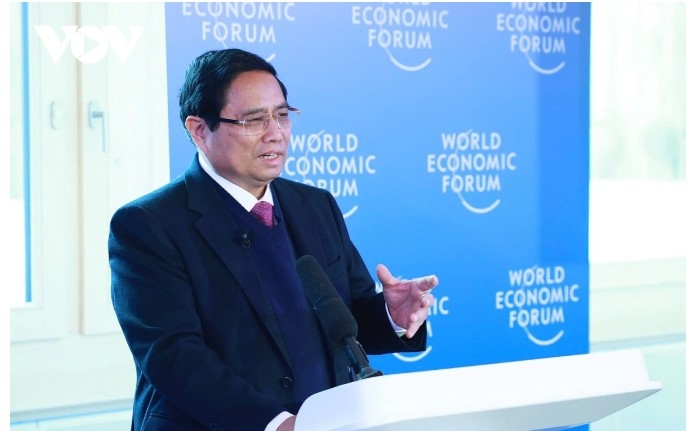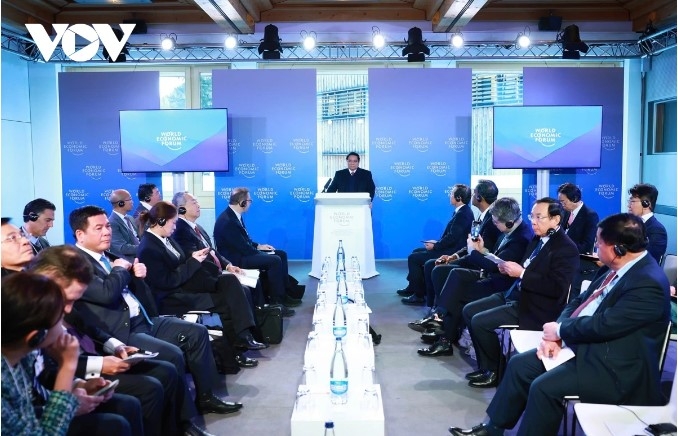PM leads national dialogue with WEF, outlines strategies for Vietnam’s growth
VOV.VN - Prime Minister Pham Minh Chinh led a high-ranking Vietnamese delegation to attend a country strategic dialogue at the 55th Annual Meeting of the World Economic Forum (WEF) on January 21 morning (local time) in Davos, Switzerland, with a focus on unlocking Vietnam’s growth potential by promoting investment and innovation for a prosperous future.

The dialogue featured the participation of the WEF's Head of Regional Agenda for Asia-Pacific Joo-Ok Lee and over 60 global business leaders who are members of the WEF. This is one of the few country dialogues held at this year’s WEF Annual Meeting and the 4th Vietnam Strategic Dialogue hosted by the WEF.
During the event, the corporations expressed strong impressions of Vietnam's economic growth of over 7% in 2024 and the government's management results amidst numerous global challenges. They shared and highly appreciated the attractive investment opportunities brought by the Vietnamese economy.
Additionally, businesses were keen to explore Vietnam's mechanisms and policies for encouraging investment in sectors such as infrastructure, liquefied gas, healthcare, oil and gas industry, and hospitality. They also inquired about policies aimed at ensuring stable power supply, streamlined procedures for implementing projects, securing human resources, and removing export barriers in some of Vietnam’s key markets.
In his speech at the event, PM Pham Minh Chinh showed his elation at attending the WEF meetings for the fourth time and praised the event’s theme. He thanked the large number of international partners and businesses for their participation, which helped to further spread the spirit of international cooperation and highlighted the role of public-private partnerships in promoting global development and prosperity.
Analyzing Vietnam's growth potential, he emphasized the resilience of the economy, which not only had to cope with challenges due to its ongoing transition, modest economic scale, and high openness but also faced natural disasters and climate change that caused significant damage. Notably, Typhoon Yagi severely impacted 26 out of 63 provinces, reducing Vietnam's GDP growth by about 0.15-0.2% in 2024.
Vietnam exceeded all 15 socio-economic development targets in 2024, achieving GDP growth of over 7%. The macroeconomy remained stable with controlled inflation, ensured major economic balances, and a high surplus. The country maintained political and social stability, strengthened national defense and security, and ensured social welfare under the principle that no one is left behind, Chinh went on.
He also stated that in 2024, Vietnam successfully appointed key leadership positions within the Party and State, reaffirming the resilience, intelligence, and solidarity of the Communist Party of Vietnam, especially during challenging times.
Concerning major global trends, the Vietnamese cabinet leader noted that today’s world is marked by political polarization, market and product diversification, supply chain restructuring, the greening of production and services, and the digitalization of human activities. Additionally, the world faces challenges such as climate change, population aging, and resource depletion. These issues require nations to prioritize multilateralism and adopt comprehensive, inclusive, and global cooperation approaches to deal with them.
In this context, to unlock growth potential and achieve strategic goals by 2030 and 2045, Vietnam is revitalizing its traditional growth drivers—investment, exports, and consumption, while fostering new ones, including the digital economy, green economy, circular economy, sharing economy, knowledge economy, and creative economy. The nation places science, technology, innovation, and digital transformation at the heart of these efforts.
In 2025, Vietnam will continue prioritizing growth alongside maintaining macroeconomic stability, controlling inflation, and ensuring key economic balances. The country aims to achieve a growth rate of at least 8% in 2025 and double-digit growth in subsequent years, positioning itself for a new era of national development—an era of prosperity, cultural advancement, and improved well-being for its people, Chinh said.

Vietnam is determined to implement three strategic breakthroughs, including institutional reform, infrastructure development, and human resource enhancement. These efforts are guided by the principles of streamlined institutions, seamless infrastructure, and intelligent human resource management.
Among these, institutional reform is regarded as the “breakthrough of all breakthroughs.” This includes reducing administrative procedures, streamlining organizational structures, and treating institutions as a resource and driver of growth. Such reforms aim to lower compliance costs and time for businesses and citizens, unlock resources, and position public investment as a catalyst for private investment.
Simultaneously, Vietnam is prioritizing the development of synchronized and modern infrastructure, encompassing both hard and soft infrastructure. Key areas include transportation, energy, digital infrastructure, climate change resilience, healthcare, education, sports, and social infrastructure. These initiatives are designed to reduce logistics costs and enhance the competitiveness of goods and services.
The Government chief stressed that Vietnam possesses the foundation and resources to achieve its set goals, gaining increasing experience, confidence, and resilience to continue its development in the new era.
Sharing updates on several strategic infrastructure projects, he revealed plans to complete the North-South high-speed railway within approximately 10 years, commence a railway project connecting Vietnam with China, Central Asia, and Europe by 2025, and finalize a nuclear power plant within five years. Additionally, major airport, seaport, and expressway projects are being accelerated to meet deadlines, with an ambitious target of reaching at least 3,000 kilometers of expressways by 2025.
Furthermore, Vietnam is making breakthroughs in human resource development, focusing on training high-quality personnel for emerging fields in the digital era, including semiconductors, artificial intelligence, cloud computing, the Internet of Things, and optoelectronics. This aims to meet the demands of businesses and investors while boosting labor productivity.
He affirmed that Vietnam will continue to harness its internal strengths, including its 100-million-strong population, natural resources, and untapped development spaces such as maritime, underground, and outer-space domains, along with its rich cultural and historical heritage.
The nation is committed to rapid and sustainable development, placing people at the center as both the subject and driver of progress. It prioritizes advancement, equity, social welfare, and environmental protection over mere economic growth and has been a frontrunner in achieving the United Nations Millennium Development Goals ahead of schedule.
He accentuated the importance of closely monitoring global and regional developments, adopting appropriate mindsets, approaches, and methodologies to craft solutions that align with Vietnam's specific conditions and circumstances. He also underscored that valuing time, intellect, and decisive action at the right moment are pivotal factors for success.
Responding to the delegates' concerns, Chinh highlighted Vietnam's implementation of a program to train 50,000 semiconductor engineers. He assured that Vietnam would face no electricity shortages, supported by comprehensive solutions, including the development of wind power, solar power, nuclear power as well as electricity imports.
Regarding the real estate sector, he said that Vietnam is refining its legal and institutional frameworks for land and real estate, linked to the development of strategic infrastructure. This aims to unlock new growth spaces, drive socio-economic progress, and promote industrial and commercial real estate development. Furthermore, efforts are being stepped up to incentivize investors to engage in the program of one million social housing apartments. Vietnam is also prioritizing investments in healthcare and fostering the cultural and entertainment industries.
PM Chinh urged partners and investors to continue collaborating with Vietnam in priority areas. These include contributing to the refinement of legal and institutional frameworks, attracting high-quality investments, developing infrastructure, offering financial incentives, advancing research and technology transfer, training, and attracting high-caliber human resources, and enhancing modern governance capabilities.
During the discussions, businesses repeatedly expressed their admiration for the Vietnamese Government's commitment to creating an attractive investment environment and its strong support for the business community.
They voiced high expectations for Vietnam's new era, marked by substantial economic growth in both quality and scale. Many affirmed their intention to align with Vietnam’s development trajectory, viewing the expansion of their investments and operations in Vietnam as a cornerstone of their long-term strategies.



